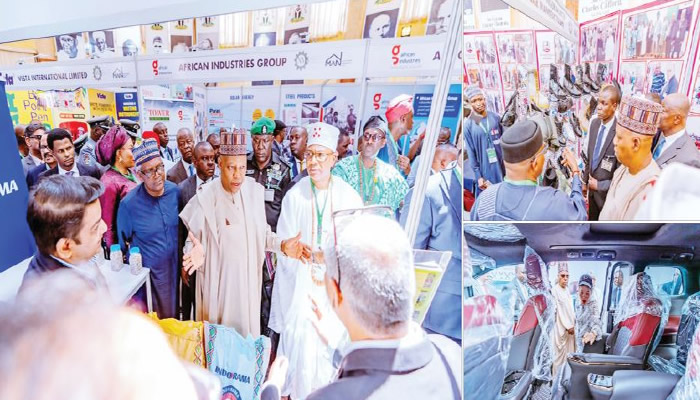Vice President Kashim Shettima has underscored the importance of prioritising local content and promoting made-in-Nigeria products, reaffirming that Executive Order 003, which mandates the patronage of locally manufactured products, remains in effect.
Speaking at the opening of the three-day National Manufacturing Policy Summit at the State House Banquet Hall, Shettima revealed that the Federal Government has partnered with the Manufacturers Association of Nigeria (MAN) to develop a comprehensive roadmap and policy framework aimed at revitalising the nation’s manufacturing sector.
He assured me that the proposed measures would be implemented swiftly to bring about the necessary changes.
Reflecting on the challenges faced by the manufacturing sector over the past decades, Shettima stated, “Distinguished ladies and gentlemen, I implore us all to leverage this summit to develop an actionable roadmap and policy framework, ready for immediate implementation, to create the changes we want in the manufacturing sector. I assure you that we shall always maintain an open-door policy to accommodate your needs and expectations.”
He emphasised the critical need to support local firms, highlighting that significant progress in industrialization can only be achieved by promoting the production of capital goods, expanding the production base, and prioritising local content. “We must be focused on expanding our production base, prioritising local content, and promoting made-in-Nigeria products,” he said.
Shettima reminded attendees that Executive Order No. 003, which supports local content in public procurement by the Federal Government, is still active and that all relevant government ministries, departments, and agencies are mandated to comply fully with the order. He stressed that Nigeria must support its indigenous firms to increase their capabilities, especially as Africa’s share of global manufacturing remains less than two percent.
The summit, he noted, provides an opportunity to re-evaluate the sector’s challenges and propose solutions. He asserted that a competitive manufacturing sector would help reduce economic inequalities and decrease overdependence on imports. “Our proposal to minimise the economic imbalances in the nation is based on strengthening the production base of our economy, particularly in manufacturing. Most of our setbacks as a nation are due to over-dependence on imports for even our basic necessities. That is why we need you to address the various challenges facing the sector and ensure we have a competitive manufacturing sector,” he added.
Expressing satisfaction with the exhibition at the summit, Shettima praised Nigeria’s industrial capabilities, creativity, and innovation. He identified five pillars essential for stimulating the manufacturing sector: upscaling productivity and competitiveness, energy security and infrastructure development, improving the macroeconomic environment and ease of doing business, promoting made-in-Nigeria products and local content development, and leveraging regional and continental trade for export development.
MAN President Francis Meshioye thanked participants for attending the summit after several postponements and expressed gratitude to President Tinubu for hosting the event. Meshioye emphasised the summit’s goal of repositioning the sector for accelerated growth, enhancing competitiveness, and benefiting the economy and citizenry.
Highlighting the challenges facing the sector, Meshioye stated, “The prevailing microeconomic environment places severe strains on the manufacturing sector, adversely affecting jobs and livelihoods.”
Former Finance Minister Olusegun Aganga urged the government to prioritise manufacturing as a national sector. He stressed that natural resources alone do not guarantee national wealth, advocating for a shift from peasant farming to commercial agriculture and from artisanal mining to attracting major miners. Aganga also recommended eliminating excessive customs duties, levies, and overlapping regulatory mandates to boost the sector.
The event was attended by key figures, including Minister of Finance and Coordinating Minister for the Economy, Wale Edun; Director-General of the National Agency for Food and Drug Administration and Control, Prof. Mojisola Adeyeye; Comptroller-General of the Nigeria Customs Service, Bashir Adeniyi; Permanent Secretary in the Ministry of Industries, Trade, and Investment, Nura Rimi; government appointees, senior manufacturing executives, and members of the diplomatic corps.



